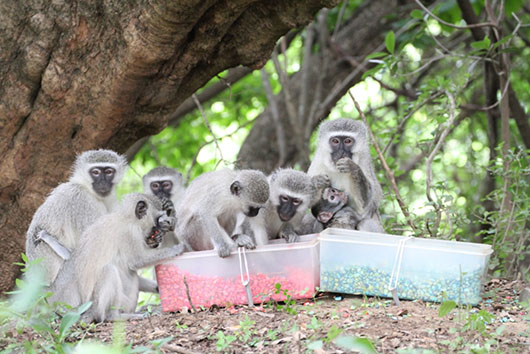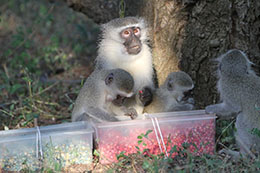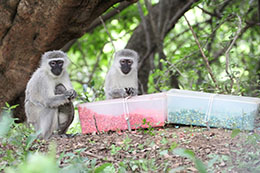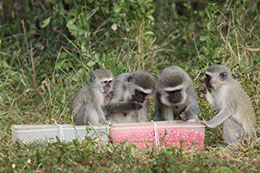Culture vultures


Human tendency to adopt the behaviour of others when on their home territory has been found in non-human primates.
Researchers at the University of St Andrews observed ‘striking’ fickleness in male monkeys, when it comes to copying the behaviour of others in new groups.
The study has been hailed by leading primate experts as rare experimental proof of ‘cultural transmission’ in wild primates to date.
The findings could help explain the evolution of our human desire to seek out ‘local knowledge’ when visiting a new place or culture.
The new discovery was made by Dr Erica van de Waal and Professor Andrew Whiten of the University of St Andrews, along with Christèle Borgeaud of the University of Neuchâtel.
The research is published today (Thursday 25 April) by the journal Science.
Professor Whiten commented, “As the saying goes, ‘When in Rome, do as the Romans do’. Our findings suggest that a willingness to conform to what all those around you are doing when you visit a different culture is a disposition shared with other primates.”

The research was carried out by observing wild vervet monkeys in South Africa. The researchers originally set out to test how strongly wild vervet monkey infants are influenced by their mothers’ habits.
But more interestingly, they found that adult males migrating to new groups conformed quickly to the social norms of their new neighbours, whether it made sense to them or not.
Professor Whiten commented, “The males’ fickleness is certainly a striking discovery. At first sight their willingness to conform to local norms may seem a rather mindless response – but after all, it’s how we humans often behave when we visit different cultures.
“It may make sense in nature, where the knowledge of the locals is often the best guide to what are the optimal behaviours in their environment, so copying them may actually make a lot of sense”.

In the initial study, the researchers provided each of two groups of wild monkeys with a box of maize corn dyed pink and another dyed blue. The blue corn was made to taste repulsive and the monkeys soon learned to eat only pink corn. Two other groups were trained in this way to eat only blue corn.
A new generation of infants were later offered both colours of food – neither tasting badly – and the adult monkeys present appeared to remember which colour they had previously preferred.
Almost every infant copied the rest of the group, eating only the one preferred colour of corn.
The crucial discovery came when males began to migrate between groups during the mating season.
The researchers found that of the ten males who moved to groups eating a different coloured corn to the one they were used to, all but one switched to the new local norm immediately.
The one monkey who did not switch, was the top ranking in his new group who appeared unconcerned about adopting local behavior.
Dr van de Waal conducted the field experiments at the Inkawu Vervet Project in the Mawana private game reserve in South Africa. She became familiar with all 109 monkeys, making it possible for her to document the behaviour of the males who migrated to new groups.
She said, “The willingness of the immigrant males to adopt the local preference of their new groups surprised us all. The copying behaviour of both the new, naïve infants and the migrating males reveals the potency and importance of social learning in these wild primates, extending even to the conformity we know so well in humans.”
Commenting on the research, leading primatologist Professor Frans de Waal, of the Yerkes Primate Center of Emory University, said that the study “is one of the few successful field experiments on cultural transmission to date, and a remarkably elegant one at that.”
ENDS
Note to Editors
The researchers are available for interview*:
Dr Erica van de Waal: Tel – +41 (0) 22 342 62 69, mobile – +41 (0) 79 820 66 27 or email [email protected]
Professor Andrew Whiten: Tel +44 (0) 1334 462073, Mobile +41 (0)7817 368 637 or email [email protected]
*Both are in Switzerland Thurs 25 / Fri 26 April – use Swiss codes as above.
“Potent social learning and conformity shape a wild primate’s foraging decisions” by Erica van de Waal, Christèle Borgeaud and Andrew Whiten is published in Science, Vol 340, Issue 6131, 2013, 25/26 April. Please contact the Science press package team at 202-326-6440 or [email protected] to receive an official version of the paper.
NB: Erica van de Waal and Frans de Waal are not related.
Note to Picture Editors
Photographs are available from the University of St Andrews Press Office and from the Science SciPak site.
Category Research